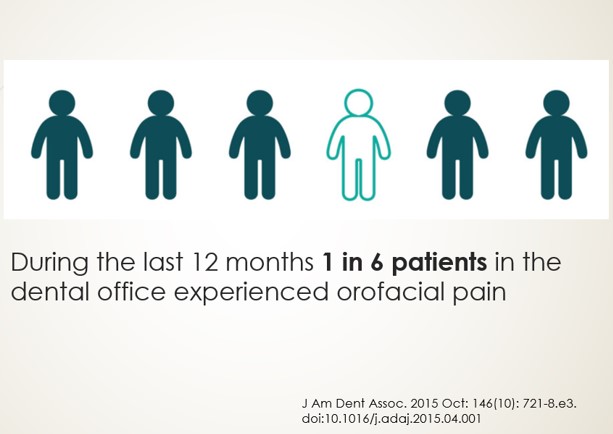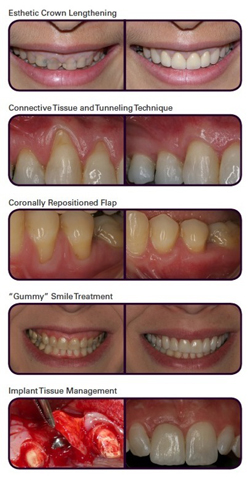21st Century TMD Protocols
21st Century TMD Protocols
McGann Postgraduate School of Dentistry is pleased to announce its first ever INTERDISCIPLINARY COURSE. Twenty-first Century TMD Protocols is a two-day seminar for dentists and mid-level providers ( Dental Hygienists, Physical Therapists, Speech and Language Pathologists, Physician Assistants, Nurse Practitioners, Behavioral Health Providers) who are interested in enhanced diagnosis and care for their patients with Temporomandibular Disorders (TMDs) and Chronic Overlapping Pain Conditions (COPCs).

Did you know? The most common orofacial pain condition is tooth pain, and the second most common is TMD.
Interdisciplinary collaboration for TMDs is necessary since TMDs are now known to be multifactorial conditions influenced by genetics, sex and gender, environmental and psychological factors. Research has shown that it is no longer appropriate to regard TMJ disorders as a localized jaw/dental condition. This requires a paradigm shift away from irreversible procedures to evidence-based, conservative treatment and management, for overall health and wellbeing.
Interprofessional education (IPE) involves different professionals learning together to improve their collaboration and communication skills. This prepares learners to work together as a team to provide patient-centered care. This interprofessional education seminar is for physical therapists, speech and language pathologists, behavioral health providers, dietitians/nutritionists, nurse practitioners, and all mid-level providers interested in managing TMDs through the biopsychosocial model.

“We hope to see you there as we delve into the management of TMDs with an interdisciplinary approach. Click here to see an intro from Suzie to learn more about what you will learn in this class. ”
Series Curriculum:
Day 1: TMD Fundamentals and Initial Exam Protocols
- Head and neck anatomy review
- TMD categories: Myofascial Pain, Internal Derangements of the TMJ, Degenerative Joint Disease
- Effectiveness of pharmacologic agents for acute or chronic pain
- Conservative management and behavior modifications you can teach patients
- TMD screening and evaluation
- Hands-On Exercise: muscle palpation and mouth opening/excursion measurements
- Headache diagnosis and treatments the dentist can provide, including Botox®
- Splint therapy: types to offer and ones to avoid
- Developing a multidisciplinary team: referrals and follow-up
- Imaging overview: what to look for on panoramic x-rays, CBCT and MRI
On Day 2 you will have the opportunity to see some cases treated using a multidisciplinary approach, and learn how partnering with physicians, oral surgeons and ancillary care providers can greatly benefit the patient. We will look at the role of the dentist in identifying simple vs. complex cases, and how case complexity changes the treatment approach. Advanced conservative management will be discussed, such as Botox, which is within the dentist’s realm to administer. We will then look at surgical staging, identify when patients require a surgical intervention and why. Additionally, you will learn about the impact of adverse events and complications, and what is being done to prevent these. Finally, you will hear about opportunities for clinicians and other stakeholders to affect change for patients suffering with these disorders.
Day 2: The Multidisciplinary Approach, Advanced Conservative Management and Surgical Pathways
- The four major types of pain: nocioceptive, inflammatory, neuropathic and functional
- Diagnostic criteria for TMD’s: keys to establishing a biologically-specific diagnosis
- Risk factors and protective factors contributing to case complexity
- Treatments such as physical therapy, nutrition counseling and low-level laser therapy offered by allied health professionals
- Overlapping conditions and their implications for successful management
- History of TMJ surgeries and technological advances
- Adverse events, complications and how these can be avoided
- Opportunities for advancing the field of TMD treatment

Dr. Suzie Bergman, tenured instructor for MPD and POS, is an educator, patient advocate and policy thought leader in the world of TMDs, and has a personal as well as professional understanding of these disorders. She is an Adjunct Associate Professor for Pacific Northwest University School of Dental Medicine. Dr. Suzie is a Fellow of the TMJ Foundation, a global consortium and online fellowship program for oral and maxillofacial surgeons, where she serves as Selection Chair, Advisor and Honorary Program Faculty. She is also a visiting scholar at Oregon Health Science University in the department of Neurosurgery, where she is a co-investigator in research surrounding the differential diagnosis of Trigeminal Neuralgia and Temporomandibular Disorders (TMD’s).
For More about Suzie Bergman, watch her TEDx Talk entitled, “Why Is Healthcare Disjointed?” Link: https://youtu.be/8ybiFvUPwAo?si=KMQpQlMK_xlk1HO4
McGann Postgrad Details
Level I Series Details:
Level II MSc Details:
Video Purchase
- Video Purchase: $900




